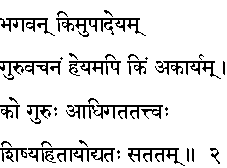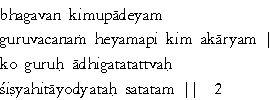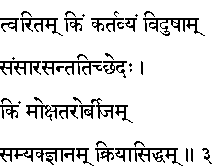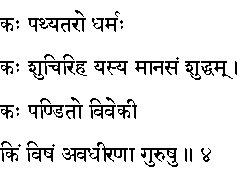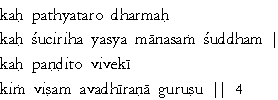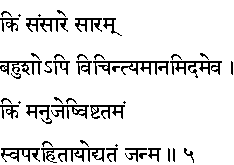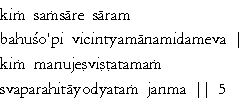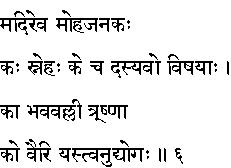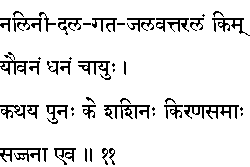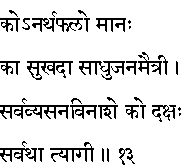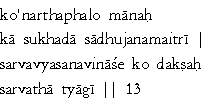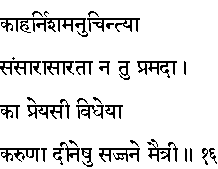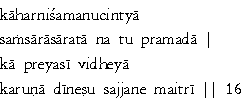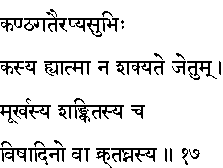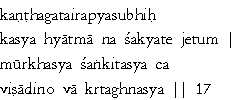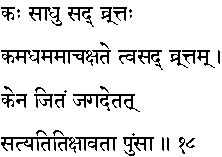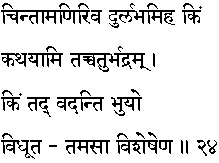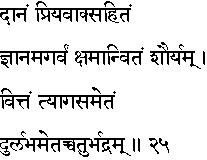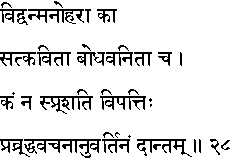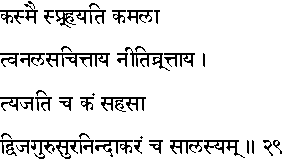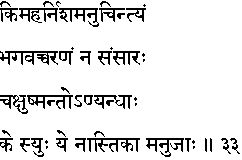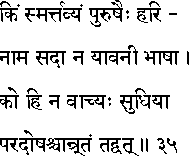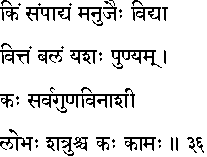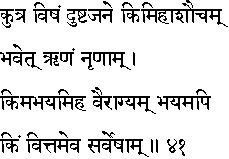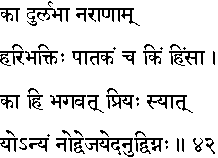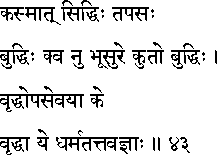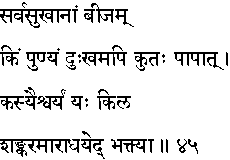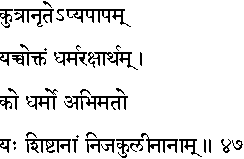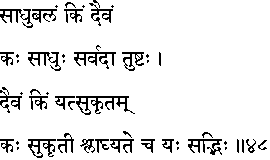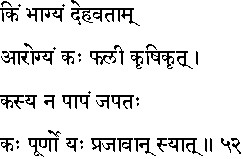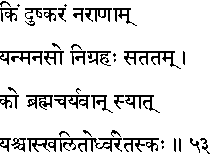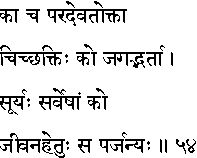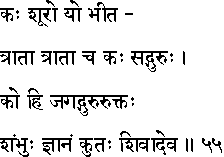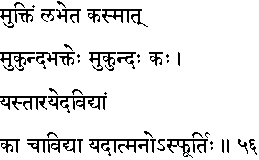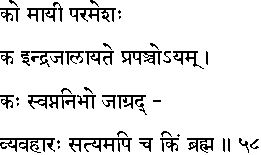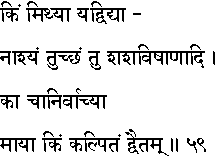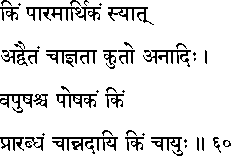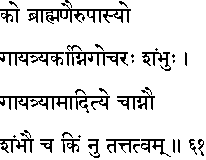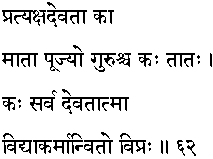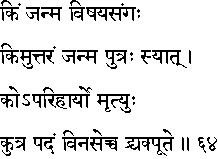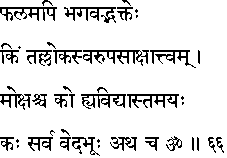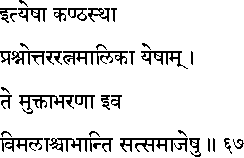Verse 29 - Meaning:
Q: To whom is the Goddess of prosperity attracted ? (kasmai sprhayati kamalaa)
A: To that one who is ever industrious(tvanalasa-cittaaya) and just. (niiti-vrttaaya)
Q: Whom(kam) does she desert promptly ? (tyajati-sahasaa)
A: That one who is lazy(saalasyam) and shows no regard for Devas(sura), Elders(guru), and Holy men. (dvija - nindaakaram)
|
Verse 33 - Meaning:
Q: What(kim) should be the subject of one's thought, (ahar-nisam) day and night ?(anu-cintyam)
A: The lotus feet of the Supreme Being(Bhagavac-caranam) and certainly not(na) the worldly matters.(samsaarah)
Q: Who should be considered as blind (caksus-manto) though having eyes? (apyandhaah - ke syuh)
A: Those who do not have faith in God. (ye naastikaa manujaah)
|
Verse 35 - Meaning:
Q: What (kim) is fit to be remembered (smartavyam) always by man ? (purusaih)
A: The Holy Name of the Lord(Hari-naama) always(sadaa), and not(na) the speech(bhaasaa) of the unregenerate ones. (yaavanii)
Q: What(ko) should a wise man(sudhiya) avoid speaking ? (na-vaacyah)
A: Talking about others' faults(para-doshaa) and speaking falsehood(caanrtam tadvat)
Verse 36 - Meaning:
Q: What(kim) should a man's(manujaih) earnings (sampaadyam) be comprised of ?
A: In knowledge(vidyaa), wealth(vittam), strength(balam) , fame(yasah) and holiness.(punyam)
Q: What(kah) destroys(vinaasii) one's merits(sarva-guna) entirely ?
A: Greed(lobhah)
Q: What(kah) is one's enemy (satru) ?
A: Sexuality(kaamah)
Verse 41 - Meaning:
Q: Where(kutra) is the receptacle of poison(visham) ?
A: In the mind of evil men. (dushta-jane)
Q: What(kim) gives(bhavet) that kind of impurity-consciousness(asaucam) which makes one avoid others ?
A: The state of indebtedness. (rnam-nrnaam)
Q: What(kim) makes a man fearless ? (abhayam)
A: The state of non-attachment.(vairaagyam)
Q: What(kim) is the cause of fear(bhayam-api) ?
A: It is wealth(vittam), indeed.
Verse 42 - Meaning:
Q: What(kaa) is the rarest virtue(dur-labhaa) in man (naraanaam) ?
A: Love of God. (hari-bhaktih)
Q: What(kim) is sinful(paatakam) ?
A: Oppression of others(including tiny creatures). (himsa)
Q: Who is(ko hi) dear(priyah-syaat) to the Lord ? (bhagavat)
A: That one(yo) who does not get angry(anyam-n-odvejayed), nor causes others to get angry.(anudvignah)
|
Verse 43 - Meaning:
Q: What causes(kasmaat) success(siddhih) ?
A: Concentrated efforts or the(tapas)
.
Q: Whose(kva) mind(buddhih) is always on the right track ?
A: Of one who honours holy men. (bhuu-sur-e)
Q: How is this state of mind produced(kuto buddhih) ?
A: Through respect for the advice of wise and elderly men.(vrddhopa-sevayaa)
Q: Who is an elderly man(as talked about above) (ke vrddhaa) ?
A: One who knows the essence of Dharma(morality). (ye-dharma-tattvajnaah)
|
|
Verse 45 - Meaning:
Q: What(kim) is the source or seed(biijam) of all happiness (sarva-sukhaanaam) ?
A: The merits of one's good actions.(punyam).
Q: What causes(api kutah) misery(duhkham) to a man ?
A: One's sins.(paapaat)
Q: How does one get endowed with(kasya) Lordliness (aisvaryam) ?
A: Only by the(yah kila) devoted worship(aaraadhayed bhaktyaa) of Sankara (God) (sankaram).
Verse 47 - Meaning:
Q: When can(kutra) telling an untruth(anrte) be considered not a sin ? (apya-paapam)
A: When that is the one and only way(yaccoktam) to protect one's Dharma. (dharma-rakshaartham).
Q: What is(ko) Dharma?
A: The traditions(yah-sishtaanaam) that one's respected ancestors(abhimato) have observed. (nija-kuliinaanaam)
|
Verse 48 - Meaning:
Q: What(kim) is the source of strength (balam) for a Saadhu ?
A: God. (daivam)
Q: Who is(kah) a Saadhu?
A: That one who is ever(sarvadaa) satisfied.(tushttah)
Q: What(kim) is one's Fate? (daivam)
(Note: Here, "daivam" is used to connote the controlling force or power in one's life)
A: One's own meritorius actions. (yat-sukrtam)
Q: Who(kah) is to be identified as one with meritorius actions to his credit ? (sukrti)
A: That one who has the approval and admiration (slaaghyate) of virtuous men. (yah-sadbhih)
|
Verse 51 - Meaning:
Q: Who(ko) is endowed with abundance(dhanyah)?
A:A Sannyaasi - or the one who has renounced everything. (samnyaasii)
|
Verse 52 - Meaning:
Q: What(kim) is the greatest good fortune(bhaagyam) for an embodied being(dehavataam)?
A: Sound Health. (aarogyam)
Q: Who(kah) reaps the fruits(phalii) ?
A: That one who works well in his field. (krsikrt)
Q: Who(kasya) will be free from sins(na-paapam)?
A: One who continuously repeats(japatah) the name of the Lord
.
Q: Who(kah) has attained fulfilment(puurno) ?
A: He who(yah-syaat) has a virtuous progeny(prajaavaan)
|
|
Verse 53 - Meaning:
Q: What(kim) is the most difficult thing(dushkaram) for a man to do(naraanaam) ?
A: To keep the mind(yan-manaso) always(satatam) under control. (nigrahah)
Q: Who(ko) can be considered as a true Brahmachari (brahmacaryavaan syaat) ?
A: That one whose libido has been sublimated. (yasca-askhalti-ordhva-retaskah)
|
|
Verse 54 - Meaning:
Q: Who is the(kaa ca) most Adorable Being(para-devat-okta) ?
A: The power of Pure-Consciousness(cit-sakthih) also known as the "Bhagavati" swarupa in Hindu mythology.
Q: Who(ko) is the ruler(bhartaa) of the Universe(jagat) ?
A: The Sun(suuryah) God(by whose light and heat all living beings are able to live).
Q: What(ko) causes and sustains(jiivana-hetuh) all life (sarveshaam) ?
A: Rain(sa-parjanyah).
|
|
Verse 55 - Meaning:
Q: Who is(kah) a hero(suuro) ?
A: He(yo) who gives protection(traata) to the frightened ones. (bhiita)
Q: Who(kah) is a true protector(traataa-ca) ?
A: A spiritual teacher(sad-guruh) or the perfect teacher, who can be likened to God.
Q: Who is(ko hi) the spiritual teacher(gurur-uktah) for the whole world (jagat) ?
A: It is "Sambhu", the Supreme Being.
Q: From whom(kutah) does one acquire knowledge (jnaanam) ?
A: From Siva indeed. (sivaad-eva)
|
|
Verse 56 - Meaning:
Q: How is(kasmaat) liberation(muktim) attained(labheta) ?
A: By whole-hearted devotion(bhakteh)to "Mukunda" or the Supreme Being.
Q: Who(kah) is "Mukunda" ?
A: It is the Being who enables Jiivaas to overcome(yas-taarayed) the sea of Ignorance(avidyaam).
Q: What is(ka ca) Ignorance(Avidya) ?
A: It is the state of absence of the full knowledge (a-sphuurtih) of one's true self(aatman)
|














